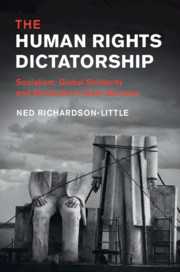(Source: CUP)
Cambridge University Press is
publishing a new book on the history of human rights in the DDR.
ABOUT THE BOOK
Richardson-Little exposes the
forgotten history of human rights in the German Democratic Republic, placing
the history of the Cold War, Eastern European dissidents and the revolutions of
1989 in a new light. By demonstrating how even a communist dictatorship could
imagine itself to be a champion of human rights, this book challenges popular
narratives on the fall of the Berlin Wall and illustrates how notions of human
rights evolved in the Cold War as they were re-imagined in East Germany by both
dissidents and state officials. Ultimately, the fight for human rights in East
Germany was part of a global battle in the post-war era over competing
conceptions of what human rights meant. Nonetheless, the collapse of
dictatorship in East Germany did not end this conflict, as citizens had to
choose for themselves what kind of human rights would follow in its wake.
ABOUT THE AUTHOR
Ned Richardson-Little, Universität
Erfurt, Germany
Ned Richardson-Little is a Freigeist Fellow at Universität Erfurt, Germany, where he leads a project on international crime and globalization. He received the Fritz Stern dissertation prize from the German Historical Institute Washington and a commendation from the Fraenkel Prize committee at the Wiener Library.
Ned Richardson-Little is a Freigeist Fellow at Universität Erfurt, Germany, where he leads a project on international crime and globalization. He received the Fritz Stern dissertation prize from the German Historical Institute Washington and a commendation from the Fraenkel Prize committee at the Wiener Library.
TABLE OF CONTENTS
Introduction. The exploitation of man by man has been
abolished!
1. Creating a human rights dictatorship, 1945–1956
2. Inventing socialist human rights, 1953–1966
3. Socialist human rights on the world stage, 1966–1978
4. The ambiguity of human rights from below, 1968–1982
5. The rise of dissent and the collapse of socialist human rights, 1980–1989
6. Revolutions won and lost, 1989–1990
Conclusion. Erasures and rediscoveries.
1. Creating a human rights dictatorship, 1945–1956
2. Inventing socialist human rights, 1953–1966
3. Socialist human rights on the world stage, 1966–1978
4. The ambiguity of human rights from below, 1968–1982
5. The rise of dissent and the collapse of socialist human rights, 1980–1989
6. Revolutions won and lost, 1989–1990
Conclusion. Erasures and rediscoveries.
More info here


No comments:
Post a Comment
Note: Only a member of this blog may post a comment.